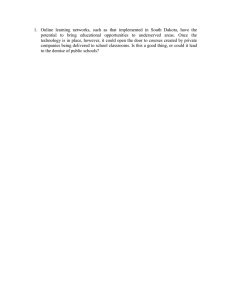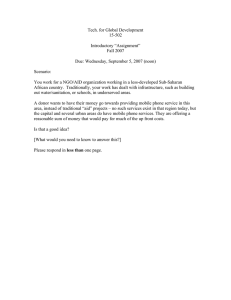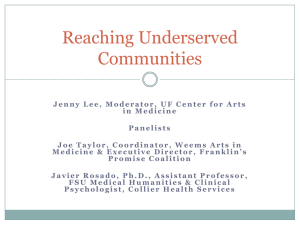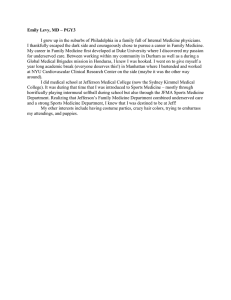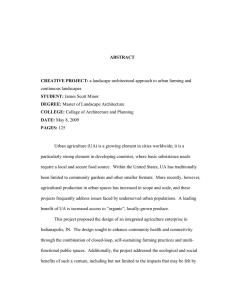What can the Internet Do for the Underserved
advertisement
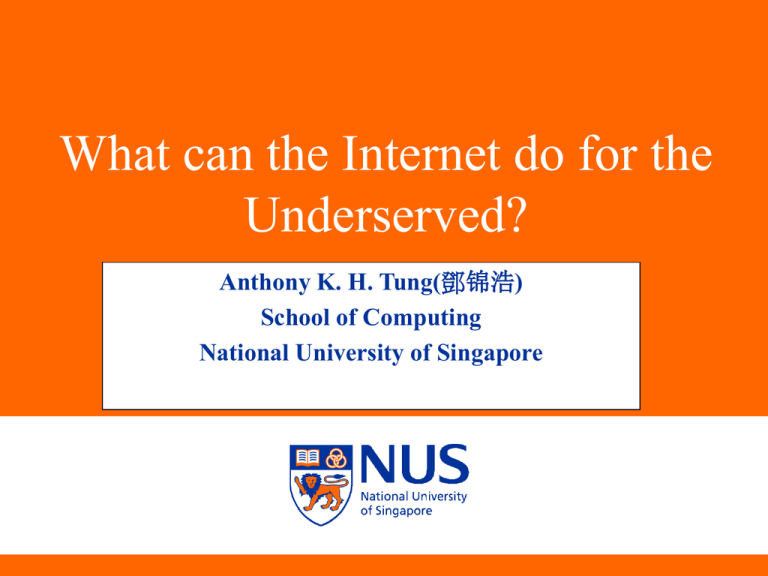
What can the Internet do for the Underserved? Anthony K. H. Tung(鄧锦浩) School of Computing National University of Singapore The Internet: Bringing Help Nearer Money Obstacle 1: Cost Expertise write Obstacle 2: Education Help providers The Internet read search Those who need help Protection by Law Computational Power Bandwidth Obstacles • Cost – One time cost can more or less be overcome although take up rate will be much higher if hardwares can be made even more simple – long term maintenance rate like energy and bandwidth cost still an issue • Education level – Illiteracy definitely an issue. Only assumption is that users can understand certain spoken language – Lack of IT knowledge ultimate test to HCI Potential Solution: Peers Donor (Read) • Peer-2-Peer connection with lots of weak clients support by strong, collaborative donor peers that contribute disk space, computation power and bandwidth • Webpages converted to audio to combat illiteracy 《马斌读报》 • Intensive mining operation done by donor peers to compress and route relevant audio clips to weak clients • “Internet Radio”: Cluster similar contents into “channels” that can be receive by a simple audio device. Content and channels can be select through simple phone messages • Can be extended to “Internet Video” for the “not so weak” clients donors weak client Internet Potential Solution: Peers Donor(Search and Write) • Essentially try to avoid the need for users to perform searches through mining and social network analysis of tags in Web 2.0 technologies. • More complex search interfaces should also be developed to provide alternatives for searches. Submission of a photograph to search for relevant pages. • Similarly, if a user want to start posting some information on the web eg. A photo and a recorded voice message, then very intensive mining operation must be done to map the submitted information into a webpage Collaborator Groups • More benefits can be brought to the underserved through enhancement of the supporting infrastructure • Large number of volunteers around the world can be organized into collaborator groups/virtual organization to help the underserved in various ways including – ensuring transparent and efficient usage of financial donation – providing expert advises in various domains including medical, legal etc. – providing protection for underserved Financial Donation • Financial donation must be managed by organization which in term require a budget to run on. A dollar donated does not correspond to a dollar reaching an underserved. • The National Kidney Foundation saga in Singapore – CEO receive million dollar salary and insist on first class flight – Currently under criminal charge for various form of absure • Managing financial donation as a collaborative group on the Internet provide more room for check and balance and in term enhance donor’s confidence • Example: A dollar donated by a person might be routed immediately to buy milk powder and this is information is also send to 4 random peers in the collaborator group which will help to keep an audit trail. Various privacy, security protocol need to be developed for this. Expert Advices • Can come in various forms, –medical advices, –underserved ’s search interpretation, –tagging for various interest groups etc. • Users/Experts ratio can be very high. Case based reasoning, mining technologies can be used to boast scalability • Abuses/prank call must be prevented Providing Protection for Underserved • Chinese fathers of child slaves seek help online. State media reported the rescue of 31 people, forced to work for a year as slaves at a brickworks run by the son of a local Communist Party official in the same province • Communication between underserved and central government difficult • Collaborative watch group can act as middle man to filter reports of abuse to government official • Among other things, system to filter off spam and false report is essential to ensure the trustworthiness of the system Workers stand at a police station after they were rescued from a brickworks in Hongdong County in Linfen, north China's Shanxi province, May 27, 2007. About 400 Chinese men whose children were sold to work as slaves at brickworks were seeking help online after risking their lives and spending all their savings in a mostly futile search. Summary • To bring the benefit of the Internet to the underserved, we have first look at how the obstacles between the underserved and the Internet can be overcome through peer donors nodes • Subsequently, we also look at how the forming of collaborating groups can in many way provide lot of assistance to the underserved. •Hopefully, you have identify some interesting research problems in between. 礼运大同篇《礼记》 大道之行也.天下为公.选贤与能.讲信修睦.故 人不独亲其亲.不独子其子.使老有所终.壮有所 用.幼有所长.矜寡孤独废疾者.皆有所养.男有 分.女有归.货恶其弃于地也.不必藏于已.力恶 其不出于身也.不必为已.是故谋闭而不兴.盗窃 乱贼而不作.故外户而不闭.是谓大同. A developed and civilized society will also ensure it’s underserved are taken care of.
